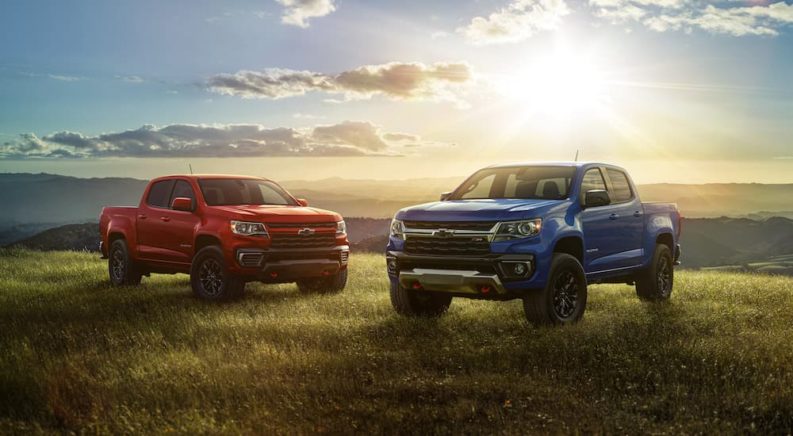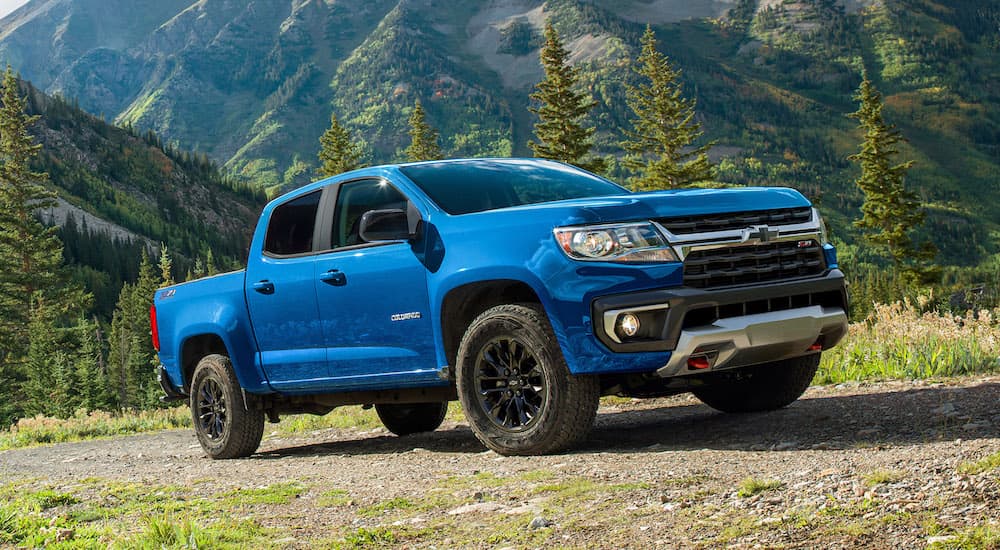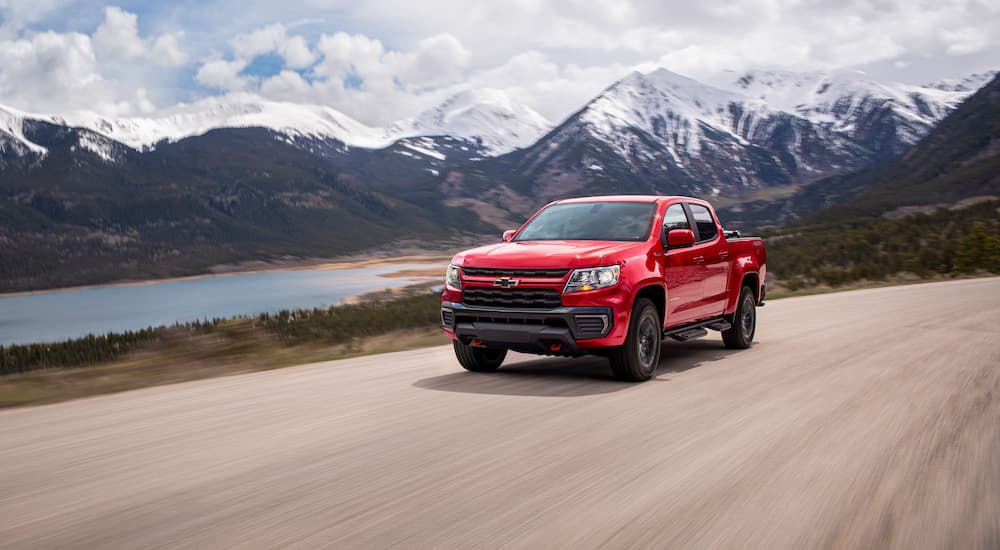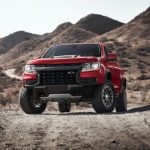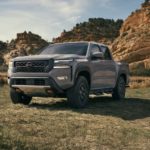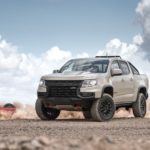The 2022 Chevy Colorado is a midsize truck built with adventure in mind, and a new package seeks to grow that reputation even further while latching on to one of the hottest trends in the rapidly growing overland scene. While the base model Colorado is well-equipped in its own right, the new Trail Boss trim package looks to up the ante even further, adding a generous complement of new features that will give any driver the confidence to tackle rough terrain.
Upgrades range from the performance-minded (recovery hooks, front 1-inch leveling kit, and performance front and mid skid plates) to the aesthetic (17-inch high-gloss black wheels and black tailgate lettering). These features give Colorados with the Trail Boss package (RPO code PEC) the equipment needed to tackle challenging terrain, but it’s the truck’s potential to add camping-ready creature features that have us particularly excited about this new Chevy offering.
A 2022 Colorado showcased by Chevy at the recent Speciality Equipment Marketing Association (SEMA) trade show included not only the Trail Boss bells and whistles but also saw the addition of a SmartCap bed cap and roof-mounted tent from Freespirit Recreation. Rooftop tents have become an increasingly common sight in recent years, with global sales increasing by an annual average of 15 percent between 2015 and 2020. Recognizing this trend, Chevy has rocketed ahead of the curve by showcasing the rooftop tent alongside the Trail Boss package and turning the off-road pickup into a rolling campsite. Let’s take a closer look at the rooftop tent trend and overland culture in general to see how Chevy’s newest offering caters to the growing set of off-the-grid adventurers.
Overlanding: An Overview
First, a word on overlanding. While the term might be new to some, the trend has existed for as long as motor vehicles have been around. At its core, overlanding simply means traveling for an extended period of time in a vehicle that serves as not only your transportation but also your sleeping accommodations, kitchen, and whatever else might be needed. The core principle of overlanding is best summed up with the zen refrain “the journey is the destination.” It’s not about getting anywhere quickly, but rather, how much fun you can have along the way. This is distinct from “off-roading” or “backcountry” driving, which is a shorter-term, more thrill-seeking endeavor focused on scaling rocks, fording streams, and otherwise testing the limits of 4WD-equipped vehicles. Often only a day in length, off-road/backcountry trips might include some overnight camping, though not always.
Overlanding has increased in popularity with those seeking a more adventurous, nomadic lifestyle. Today’s social media networks are rife with #overlanding and #vanlife posts, but it was initially born out of necessity. The trend dates back to Australia in the early 1900s, where cattle drivers would forge new paths through the vast, empty continent to get their herds to market. It evolved into a recreational activity in the 1940s thanks in part to the tales of Australian pioneer and surveyor Lenard “Len” Beadell, who would traverse the Outback to cut the famous 870-mile Gunbarrel Highway. Navigating the far-flung scrubland in a Land Rover, Beadell encountered no shortage of the life-threatening obstacles – and animals – that the continent is so famous for, inspiring adventurers around the globe to test their mettle with these types of extended journeys.
It was around this time that the rooftop tent began to gain popularity, first appearing in Western Europe and Australia. The tents not only gave overlanders a more spacious sleeping alternative to their truck bed or backseat but a safer one as well. Elevated a good five to six feet off the ground, these rooftops tents protected drivers from the elements and discouraged predators from enjoying a midnight snack. They could also be set up virtually anywhere, eliminating the need for drivers to find a suitably flat or soft piece of land on which to pitch a tent.
The new generation of rooftop tents offers all those advantages and more, including a number of upgrades made possible by today’s high-tech manufacturing processes. While there’s no word on which specific model of rooftop tent was used for Chevy’s SEMA truck, a closer look at some offerings from Freespirit Recreation gives us a hint at the potential candidates to crown the 2022 Colorado. Designed to fit the 2021 Colorado, Freespirit’s High Country 55-inch rooftop tent can accommodate 2-3 people, offering quick, fold-out construction that will have your tent ready before the engine’s even cold.
The tent features hanging storage pockets, an integrated LED light strip, and a rain fly that gives the tent 50+ UV sun protection. Advanced fabrics like black tri-layer 150D Rip-Stop Poly-Oxford body material and a 210D Rip-Stop Poly-Oxford rainfly with a polyurethane coating keep you dry and cozy, and the unique rooftop construction allows for one major advantage over your average ground tent: a built-in mattress. The High Country 55-inch, for example, features two inches of EPE foam flooring and a 2.75-inch high-density foam mattress, providing a better night’s sleep than one might expect on top of their truck.
The SEMA showcase of the Trail Boss-equipped Colorado saw the Freespirit tent perched on top of a SmartCap EVOs Sport truck cap. Notable in the industry for being one of the few manufacturers to opt for fully stainless steel construction, SmartCaps are a good deal more rugged than the standard aluminum or fiberglass alternative. Accidents happen, but with SmartCap’s unique 5-panel construction, any damaged element can be easily replaced without necessitating a complete overhaul. Simply swap out the damaged panel for a new one, and you’ll be back on the trail before you know it.
Given these novel advantages – and a three-year warranty – it’s little surprise Chevy opted to go with SmartCap for this particular application. Despite being one of the more expensive manufacturers in the sector, the brand’s reputation for dependability in difficult conditions makes it the perfect complement to the adventure-ready Colorado Trail Boss.
A Growing Off-Road Reputation
Chevy is no stranger to the off-road scene. In 2017 the company set out to produce a Colorado capable of hanging with the off-road veterans, introducing the performance-minded ZR2. Equipped with either a 3.6-liter V6 or 2.8-liter Turbo Diesel, the ZR2 sits two inches higher and is 3.5 inches wider than the base model Colorado. The 2022 ZR2 includes front and rear locking differentials, integrated trailer brake control, and Multimatic’s DSSV damping technology for an exceptionally smooth ride under almost any conditions.
Marketing jargon and hype are one thing, but the ZR2 has proven its off-road credentials where it counts, landing some very powerful fans in the process. Not only has the pickup served as the inspiration for the U.S. Army’s Infantry Squad Vehicle, but it was also the template for an experimental fuel cell electric truck developed in a collaboration between GM Defense and U.S. Army’s Tank Automotive Research, Development and Engineering Center (TARDEC). While most drivers are unlikely to put their own Colorados through as much as the typical Army squad, “battlefield tested” is about as good of a superlative as you could ask for in an off-road pickup.
The Colorado ZR2 also made an appearance at SEMA alongside the Trail Boss, as Chevy set out to showcase the ZR2’s impressive range of customization possibilities with the unveiling of the ZR2 Extreme Off-Road variant. Designed to showcase the off-road parts available from Chevrolet Accessories and Chevrolet Performance, this concept truck included the sort of heavy-duty hardware that wouldn’t be out of place in popular off-roading destinations like Moab or Baja.
The model on display at November’s SEMA show in Las Vegas featured Chevrolet Accessories’ 30-inch light bar, an off-road sport bar behind the cab, Baja Designs squadron sport lamps, and crew cab rocker panel guards. Powered by a 3.6-liter V6 capable of producing 308 horsepower, the Extreme Edition combines the ZR2’s already impressive power with a slate of accessories that solidify its off-road reputation.
More Off-Road Potential
With the Trail Boss package, Chevy is looking to extend that same off-road legacy to the two middle-tier trim levels of the 2022 Colorado: the LT and Z71. Offered on the 4WD versions of these two models, the Trail Boss package includes a slate of upgrades that take more than a few cues from the ZR2. The LT and Z71 are both available with the same engine options as the ZR2, not to mention features like skid plates, recovery hooks, and the same wheels found on the higher-end truck itself. The off-road-focused trim option isn’t entirely new.
Chevy offered a similar Trail Boss package on the 2015 and 2016 Colorados that included a transfer case shield, front recovery hooks, three-inch rocker steps, and an automatic locking rear differential. With those prior models now getting on in years, seeing Chevy dust off the Trail Boss moniker comes as little surprise. The reintroduction of the Trail Boss package is exciting news for any Chevy fans looking to expand their off-road options. With the upgraded LT and Z71, the ZR2, and a host of specialty parts to choose from, few midsize pickups can match the flexibility of the 2022 Chevy Colorado.
From heavy-duty specialty hardware and the type of bold styling that one finds on today’s high-performance super trucks to the potential to add a roof-mounted tent and stainless steel bed cap, the Colorado is the perfect compliment for any drivers looking to hit the backcountry or explore the world of overland travel. An adventurer’s best friend, the 2022 Colorado is the all-in-one vehicle that won’t quit when the road gets a little rocky.

